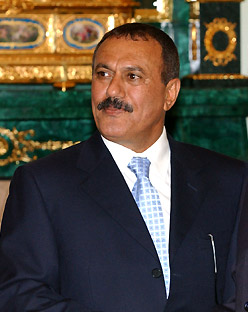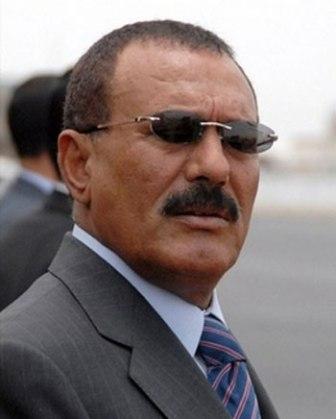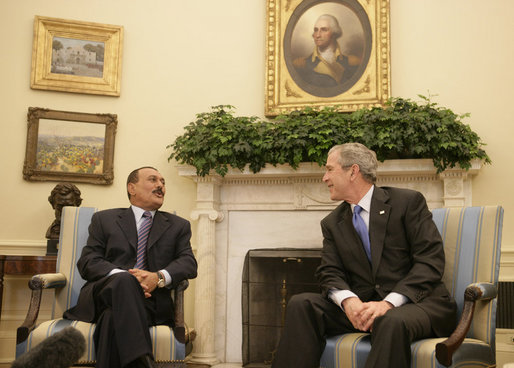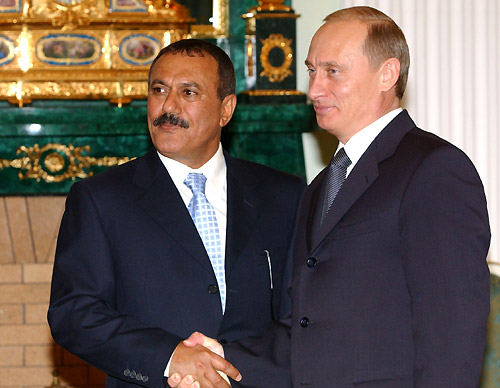<Back to Index>
- President of Yemen Ali Abdullah Saleh, 1942
PAGE SPONSOR



Ali Abdullah Saleh (Arabic: علي عبدالله صالح; 21 March 1942 - 4 December 2017) was a Yemeni politician who was President of Yemen from 1990 to 2012. Saleh had previously served as President of the Yemen Arab Republic (North Yemen) from 1978 until 1990; upon the unification of North Yemen and South Yemen in 1990, he became President of Yemen.
After more than 33 years in power, Saleh signed the Gulf Cooperation Council agreement in November 2011, paving the way for his vice president to become acting president until February 21, 2012; at that point the vice president would be elected to the presidency. On January 22, 2012, the Yemeni parliament passed a law that granted Saleh immunity from being prosecuted and he left Yemen for treatment in the United States. Saleh stepped down and formally ceded power to his deputy Abd Rabbuh Mansur Al-Hadi at the Presidential Palace on 27 February 2012.
In May 2015, Saleh openly allied with the Houthis (Ansar Allah) during the Yemeni Civil War, in which a protest movement and subsequent insurgency succeeded in capturing Yemen's capital, Sana'a,
causing President Abdrabbuh Mansur Hadi to resign and flee the country.
In December 2017, he declared his withdrawal from his coalition with
the Houthis and instead sided with his former enemies – Saudi Arabia, the United Arab Emirates and President Hadi. Accused of treason by the Houthis, he was killed by a Houthi sniper while attempting to flee the capital city of Sana'a amidst the 2017 battle for the city on 4 December 2017.
Saleh was born in the town of Bait el-Ahmar, in the Al-Ahmar family of the small Sanhan tribe, a tribe whose territories lie some 20 kilometers southeast of the capital Sana'a (the Al-Ahmar family of Sanhan is often falsely confounded with the identically named ruling family of the Hashid tribal confederacy, a confederacy to which the Sanhan tribe belongs). Saleh is a Zaydi Shia Muslim. He is a "non - Hashimi" Zaydi (not a direct descendant of the Islamic prophet Muhammad's grandfather), and would not have been eligible to rule under the Zaydi Mutawakkilite Kingdom of Yemen that ruled the country until 1962.
Saleh obtained less than an elementary school education. He joined the North Yemeni armed forces in 1958 and the North Yemen Military Academy in 1960, and became a corporal. Three years later, he was commissioned from the ranks as a second lieutenant. In 1977, the President of North Yemen, Ahmed bin Hussein al-Ghashmi, appointed him as military governor of Ta'izz.
After al-Ghashmi was assassinated on 24 June 1978, Saleh was
appointed to be a member of the four man provisional presidency council
and deputy to the general staff commander. On 17 July 1978, Saleh was elected by the Parliament to be the President of the Yemen Arab Republic, chief of staff and commander - in - chief of the armed forces.
On 10 August 1978, Saleh ordered the execution of 30 officers charged to be part of a conspiracy against his rule.
Saleh was promoted to colonel in 1979, elected the secretary general of the General People's Congress party on 30 August 1982, and re-elected president of the Yemen Arab Republic in 1983.
The decline of the Soviet Union severely weakened the status of South Yemen, and, in 1990 the North and South agreed to unify after years of negotiations. The South accepted Saleh as President of the unified country, while Ali Salim al-Beidh served as the Vice President and a member of the Presidential Council.
Ali Abdullah Saleh was a long time ally of Iraq's Saddam Hussein and supported Hussein's invasion of Kuwait in 1990. After Iraq lost the Gulf War, Yemeni workers were deported from Kuwait by the restored government.
In the 1993 parliamentary election, the first held after unification, Saleh's General People's Congress won 122 of 301 seats.
On 24 December 1997, Parliament approved Saleh's promotion to the rank of field marshal. He was the highest ranking military officer in Yemen.
Saleh became Yemen's first directly elected president in the 1999
presidential election, winning 96.2% of the vote. The only other
candidate, Najeeb Qahtan Al-Sha'abi, was the son of Qahtan Muhammad
al-Shaabi, a former President of South Yemen. Though a member of Saleh's
General People's Congress (GPC) party, Najeeb ran as an independent.
After the 1999 elections the Parliament passed a law extending presidential terms from five to seven years, extending parliamentary terms from four to six years, and creating a 111 member, presidentially appointed council of advisors with legislative power. This move prompted Freedom House to downgrade their rating of political freedom in Yemen from 5 to 6.
In July 2005, during the 27th anniversary celebrations of his presidency, Saleh announced that he would "not contest the [presidential] elections" in September 2006. He expressed hope that "all political parties – including the opposition and the General People's Congress – find young leaders to compete in the elections because we have to train ourselves in the practice of peaceful succession." However, in June 2006, Saleh changed his mind and accepted his party's nomination as the presidential candidate of the GPC, saying that when he initially decided not to contest the elections his aim was "to establish ground for a peaceful transfer of power", but that he was now bowing to the "popular pressure and appeals of the Yemeni people." Political analyst Ali Saif Hasan said he had been "sure [President Saleh] would run as a presidential candidate. His announcement in July 2005 – that he would not run – was exceptional and unusual." Mohammed al-Rubai, head of the opposition supreme council, said the president's decision "show[ed] that the president wasn’t serious in his earlier decision. I wish he hadn’t initially announced that he would step down. There was no need for such farce."
In the 2006 presidential election, held on 20 September Saleh won with 77.2% of the vote. His main rival, Faisal bin Shamlan, received 21.8%. Saleh was sworn in for another term on 27 September.
In December 2005, Saleh stated in a nationally televised broadcast
that only his personal intervention had preempted a U.S. occupation of
the southern port of Aden after the 2000 USS Cole bombing,
stating "By chance, I happened to be down there. If I hadn’t been, Aden
would have been occupied as there were eight U.S. warships at the
entrance to the port."
However, transcripts from the U.S. Senate Armed Services Committee
state that no other warships were in the vicinity at the time.
In April 2000, Saleh visited Tehran to cement Iranian - Yemeni military relations, and to support Iran in its dispute with the United Arab Emirates over the Greater and Lesser Tunbs. Saleh, a Shia, prayed at the mausoleum of Iranian Supreme Leader Ayatollah Khomeini.
The 2003 invasion of Iraq toppled Saddam Hussein and created concern in the region that other leaders would follow suit; as a result, on 15 May 2003, Iranian President Mohammed Khatami visited Iran's two regional allies, Syria and Yemen, to strengthen Iran's regional security links.
Iran continued to garner support from Yemen well into December 2010, with Mahmoud Ahmedinejad meeting with Saleh on Iran - Yemen cooperation, whereupon Saleh confirmed his support for Iran's nuclear energy program.
As the Sunni southern secessionist
movement accelerated from 2007 onward, emboldened by Southern Sudan's
secession in February 2011, Saleh increasingly turned to Iran for
support.
Iranian officials saw Saleh as critical to preserving Shia rule over
formerly independent Sunni South Yemen, which encompasses the strategic
port of Aden, and have expressed their support for his crackdown on
Sunni southern separatists "in order to preserve territorial integrity".
In early 2011, following the Tunisian revolution that resulted in the overthrow of the long time Tunisian president, opposition parties attempted to the do the same in Yemen. Opposition started leading protesters and demanding Saleh to end his three decade long rule because of his perceived lack of democratic reform, widespread corruption and the claimed human rights abuses carried out by him and his allies.
On 2 February 2011, facing a major national uprising, Saleh announced that he would not seek re-election in 2013, but would serve out the remainder of his term. In response to government violence against unarmed protesters, eleven MPs of Saleh's party resigned on 23 February. By 5 March, this number had increased to 13, as well as the addition of two deputy ministers.
On 10 March 2011, Saleh announced a referendum on a new constitution, separating the executive and legislative powers. On 18 March, at least 52 people were killed and over 200 injured by government forces when unarmed demonstrators were fired upon in the university square in Sana'a. The president claimed that his security forces weren't at the location, and blamed local residents for the massacre.
Saleh fired his entire Cabinet on 20 March 2011, but asked them to remain as a caretaker cabinet until he could form a new government. On 22 March, Saleh warned that any attempt at overthrowing him would result in civil war.
On 7 April 2011, A U.S. state department cable obtained by WikiLeaks reported plans of Hamid al-Ahmar, Islah Party leader, prominent businessman, and de facto leader of Yemen's largest tribal confederation, claimed that he would organize popular demonstrations throughout Yemen aimed at removing President Saleh from power.
On 23 April 2011, facing massive nationwide protests, Saleh agreed to step down under a 30 day transition plan in which he would receive immunity from criminal prosecution. He stated that he planned to hand power over to his Vice President, Abd Rabbuh Mansur al-Hadi as part of the deal.
On 18 May 2011, he agreed to sign a deal with opposition groups, stipulating that he would resign within a month; On 23 May, Saleh refused to sign the agreement, leading to renewed protests and the withdrawal of the Gulf Cooperation Council from mediation efforts in Yemen.
On 3 June 2011, Saleh was injured in an RPG attack on his presidential compound, which killed four body guards and injured the prime minister, deputy prime minister, and the governor of Sanaa. The man responsible for speaking at Saleh's public events was reported killed. Saleh suffered burns and shrapnel injuries, but survived, a result that was confirmed by an audio message he sent to state media in which he condemned the attack, but his voice clearly revealed that he was having difficulty in speaking. Government officials tried to downplay the attack by saying he was lightly wounded. The next day he was taken to a military hospital in Saudi Arabia for treatment. According to U.S. government officials, Saleh suffered a collapsed lung and burns on about 40 percent of his body. A Saudi official said that Saleh has undergone two operations: one to remove the shrapnel and a neurosurgery on his neck.
On 4 June 2011, Vice President Abd Rabbuh Mansur al-Hadi was appointed as acting President, while Saleh remained the President of Yemen.
On 7 July 2011, Saleh appeared for the first live television appearance since his injury. He appeared badly burned and his arms were both bandaged. In his speech, he welcomed power sharing but stressed it should be "within the framework of the constitution and in the framework of the law".
On 19 September 2011, he was pictured without bandages, meeting King Abdullah.
On 23 September 2011, Yemeni state television announced that Saleh had returned to the country after three months amid increasing turmoil in a week that saw increased gun battles on the streets of Sana'a and more than a 100 deaths.
Saleh said on 8 October 2011, in comments broadcast on Yemeni state television, that he would step down "in the coming days". The opposition expressed skepticism, however, and a government minister said Saleh meant that he would leave power under the framework of a Gulf Cooperation Council initiative to transition toward democracy.
On 23 November 2011, Saleh flew to Riyadh in neighboring Saudi Arabia to sign the Gulf Co-operation Council plan for political transition, which he had previously spurned. Upon signing the document, he agreed to legally transfer the office and powers of the presidency to his deputy, Vice President Abd Rabbuh Mansur al-Hadi.
It was reported that Saleh had left Yemen on 22 January 2012 for medical treatment in New York City. He arrived in the United States 6 days later.
Saleh left the USA for Ethiopia on 24 February 2012 after receiving medical treatment. He returned to Yemen the next day. He arrived at the military airport in Sana'a hours before the oath taking of his successor Abd Rabbuh Mansur Al-Hadi which resulted into protests against his return and the inability of the new government to prevent his entry into Yemen. On 27 February 2012, Saleh formally ceded power to his deputy Abd Rabbuh Mansur Al- Hadi and stepped down as the President of Yemen, pledging to support his efforts to "rebuild" a country still reeling from months of violence. The Associated Press also reported that Saleh and his family were preparing to go into exile in Ethiopia by the end of the month.
In February 2013, Saleh opened a museum documenting his 33 years in power, located in a wing of the Al-Saleh Mosque in Sanaa. One of the museum's central display cases exhibits a pair of burnt trousers that Saleh was wearing at the time of his assassination attempt in June 2011. Other displays include fragments of shrapnel that were taken out of his body during his hospital treatment in Saudi Arabia, as well as various gifts given to Saleh by kings, presidents and world leaders over the course of his rule.
Later that year, in October, the United Nations Special Envoy to Yemen, Jamal Benomar said that Saleh and his son have the right to run in the next Yemeni presidential election, as the 2011 deal does not cover political incapacitation.
Saleh was a behind-the-scenes leader of the Houthi takeover in Yemen led by Zaydi Houthi forces. Tribesmen and government forces loyal to Saleh joined the Houthis in their march to power. On 28 July 2016, Saleh and the Houthi rebels announced a formal alliance to fight the Saudi-led military coalition, run by a Supreme Political Council of 10 members – made up of five members from Saleh's General People's Congress, and five from the Houthis. The members were sworn in on 14 August 2016.
The United Nations Security Council
imposed sanctions on Saleh in 2014, accusing him of threatening peace
and obstructing Yemen's political process, subjecting him to a global
travel ban and an asset freeze.
Houthi spokesperson Mohamed Abdel Salam stated that his group had spotted messages between the United Arab Emirates (UAE) and Saleh three months before his death. He told Al-Jazeera that there was communication between Saleh, UAE and a number of other countries such as Russia and Jordan through encrypted messages. The alliance between Saleh and the Houthi broke down in late 2017, with armed clashes occurring in Sana'a from 28 November. Saleh declared the split in a televised statement on 2 December, calling on his supporters to take back the country and expressed openness to a dialogue with the Saudi led coalition.
On 4 December 2017, Saleh's house in Sana'a was assaulted by fighters of the Houthi movement, according to residents. Saleh was killed on his way to Ma'rib while trying to flee into Saudi controlled territories after a rocket propelled grenade struck and disabled his vehicle in an ambush and he was subsequently shot in the head by a Houthi sniper, something his party denied. Houthis published a video allegedly depicting Saleh's body with a headshot wound. His death was confirmed by a senior aide to Saleh, and also by Saleh's nephew. His death has been described as an embarrassment in a long list of Saudi foreign policy failures under Mohammad bin Salman. The attack also resulted in the death of General People's Congress' assistant secretary Yasser al-Awadi.
Saleh's home was captured by Houthis before he fled. Officials of his party General People's Congress, while confirming his death, stated that a convoy he and other party officials were travelling in was attacked by Houthis as they fled towards his hometown Sanhan. Houthi leader Abdul Malik al-Houthi meanwhile celebrated his death and called it "the day of the fall of the treasonous conspiracy". He also stated that his group had "no problem" with the GPC or its members. Abdrabbuh Mansur Hadi offered condolences for his death and called for an uprising against the Houthis. The Houthis accused the UAE of dragging Saleh to "this humiliating fate."
On 9 December 2017 he was buried in Sana'a, according to an official. According to a Houthi commander, the burial was held in strict conditions with no more than 20 people attending.

